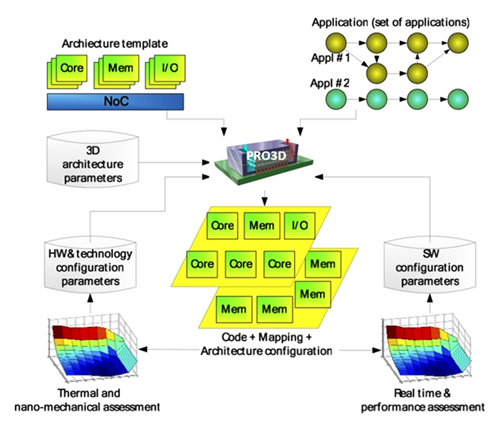Go to
PRO3D

PRO3D: Programming for Future 3D Architecture with Many Cores

Overview:
The shift from systems-on-chip (SoC) to manycore architectures brings new hardware and software challenges ranging from seamless integration of processors, memories, the design of modular systems and application software to run on massively parallel and scalable platforms. Manycores will benefit tremendously from 3-dimensional (3D) integration technology that enables distribution in space of computational and storage functions to achieve unprecedented performance levels.
PRO3D is an ambitious high risk and high reward project that builds upon existing European world-class R&D expertise of the partners. PRO3D will innovate in both hardware and software technologies and demonstrate the effectiveness of manycores by an integrated and concerted effort in key aspects of hardware and software design. The uniqueness of this proposal stems from the experience of the partners in various aspects of manycore design that need to be addressed concurrently.
The key outcome of PRO3D will be a holistic system design methodology to bring a drastic improvement of productivity to reduce cost development and time to market for future embedded computing. In particular, PRO3D will: i) develop a system software flow that can operate transparently on parallel manycore platforms; ii) develop formal methods for software design guaranteeing the composability and correct operation of both hardware and software; iii) explore the impact of 3D integration for new computing architectures iv) Extend the software-flow to 3D-stacked manycores.
The PRO3D consortium brings together world-class leaders in their own field with competencies to cover software, architecture and 3D integration. One of the key differentiators of the PRO3D consortium is its access to an industrial manycore System on Chip, named "Platform 2012" and provided by STM. The industrial impact of PRO3D is potentially high since research outcomes will be directly exploitatable into STM product roadmaps.
Project Participants:
Three research laboratories from Centre SI will be collaborating in this project:
Integrated Systems Laboratory (LSI - Prof. Giovanni De Micheli)
Microelectronic Systems Laboratory (LSM - Prof. Yusuf Leblebici)
Embedded Systems Laboratory (ESL - Prof. David Atienza)
